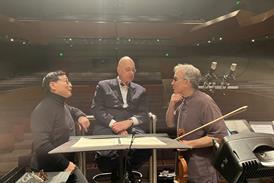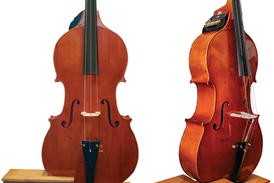The study from Help Musicians and Musicians’ Union of nearly 6,000 UK musicians found that those at the start of their careers were most impacted

Read more news stories here
Almost a third of professional musicians in the UK (30 per cent) are experiencing poor mental wellbeing, according to findings from the first ever UK Musicians’ Census.
The results are based on detailed information provided by nearly 6,000 UK musicians, making it the largest ever survey of its kind. This next wave of research published from the Census - by Help Musicians and the Musicians’ Union - focuses on the mental health of those working as musicians, finding that 30 per cent of musicians reported experiencing negative mental wellbeing.
Those who are just about to start their professional journey report the highest rates of negative mental wellbeing by career stage. 41 per cent of students studying music reported negative mental wellbeing, highlighting the need for dedicated support for those at the very early stages of their career, helping to prevent crises before they arise and supporting the future generation to stay healthy.
Low mental wellbeing could lead many to leave the industry. Among musicians who reported having extremely negative mental wellbeing, 42 per cent say it is ‘very’ or ‘fairly’ likely that they will change careers within the next five years.
Low earnings are another contributing factor to poor mental wellbeing - 43 per cent of professional musicians in the UK earn less than £14,000 a year. The lowest earners (earning less than £7,000 a year from music) were found to be twice as likely to report low mental wellbeing (35 per cent) compared to those earning £55,000 and above (17 per cent).
Experiencing - or witnessing - discrimination while working in the music industry were also found to be linked to negative mental wellbeing. Among those who reported as having poor mental health, nearly 21 per cent say they have experienced discrimination, compared to 14 per cent of musicians overall. Overall, nearly a quarter (23 per cent) of musicians stated they do not earn enough to support themselves or their families - but the figure rises significantly to 37 per cent among those with poor mental health. Furthermore, half of musicians with low mental health say they are in debt (47 per cent).
Musicians in England were least likely to report low mental wellbeing (30 per cent) compared to respondents in other nations: Wales (37 per cent), Northern Ireland (34 per cent) and Scotland (33 per cent).
Chris Difford, musician, songwriter and principal ambassador of Music Minds Matter commented: ’I believe that at the core of every musician’s life is a deep need to find a stable and wonderful creative mind, but the realities of the industry sometimes don’t allow this to happen. Working with likeminded people and sharing how we feel is something I love doing with both Help Musicians and now with Music Minds Matter.’
’Insights from the Musicians’ Census show the need to build positive mental wellbeing for all who work in music but especially with the future generation so we can prevent crises before they happen,’ said Sarah Woods, chief executive of Help Musicians & Music Minds Matter. ’We would encourage everyone working in music to digest this report and work together so we can continue building an industry with positive mental health for all.’
Read: ‘When someone is healthy inside, it sounds that way’ - Mental health services in conservatoires
Read more news stories here
The number one source for playing and teaching books, guides, CDs, calendars and back issues of the magazine.
In The Best of Technique you’ll discover the top playing tips of the world’s leading string players and teachers. It’s packed full of exercises for students, plus examples from the standard repertoire to show you how to integrate the technique into your playing.
The Strad’s Masterclass series brings together the finest string players with some of the greatest string works ever written. Always one of our most popular sections, Masterclass has been an invaluable aid to aspiring soloists, chamber musicians and string teachers since the 1990s.
American collector David L. Fulton amassed one of the 20th century’s finest collections of stringed instruments. This year’s calendar pays tribute to some of these priceless treasures, including Yehudi Menuhin’s celebrated ‘Lord Wilton’ Guarneri, the Carlo Bergonzi once played by Fritz Kreisler, and four instruments by Antonio Stradivari.











































No comments yet